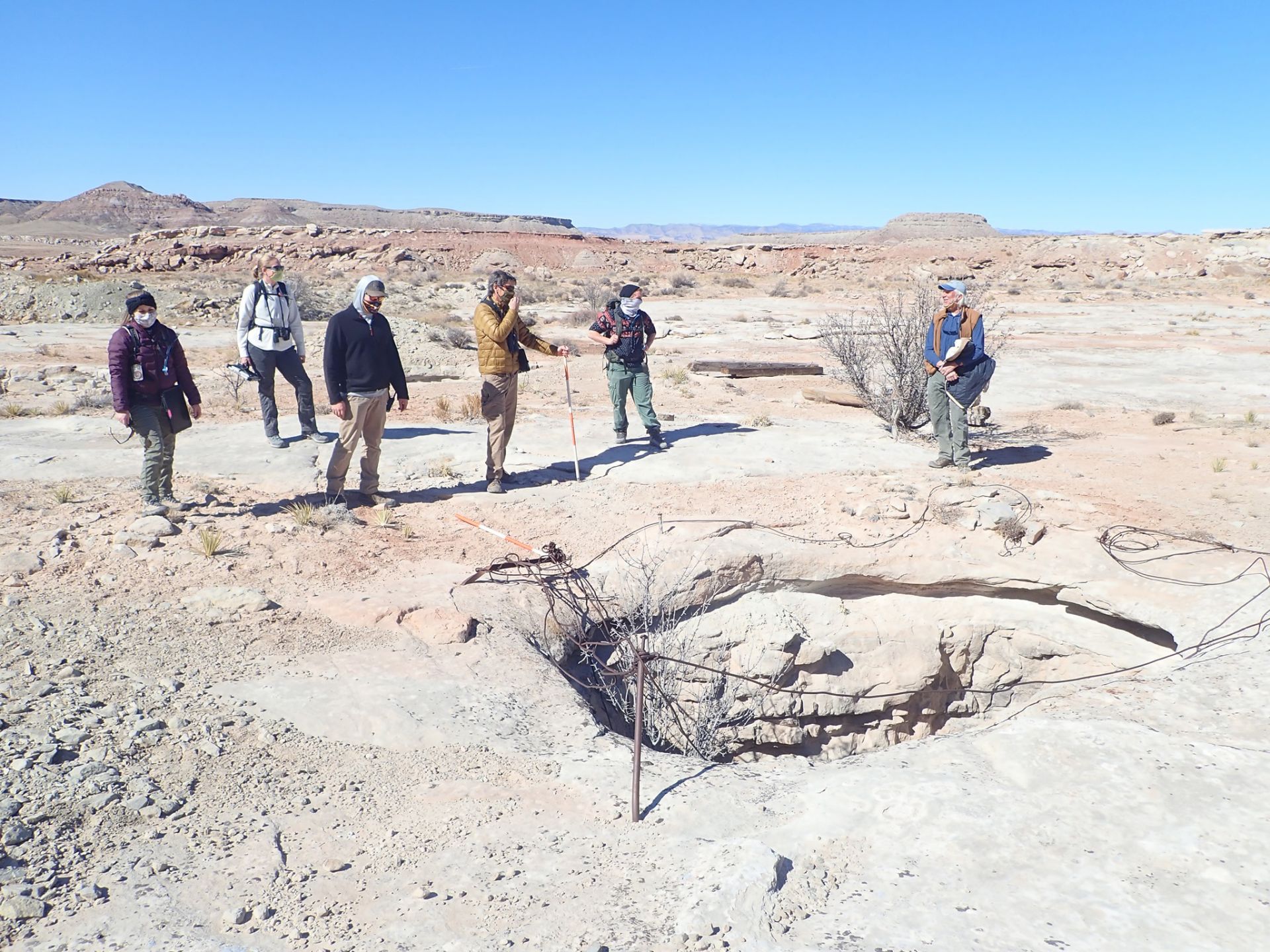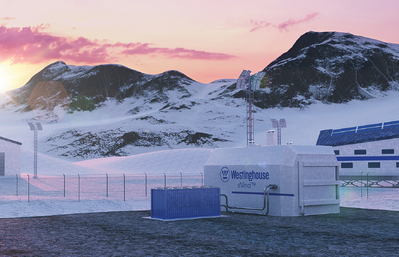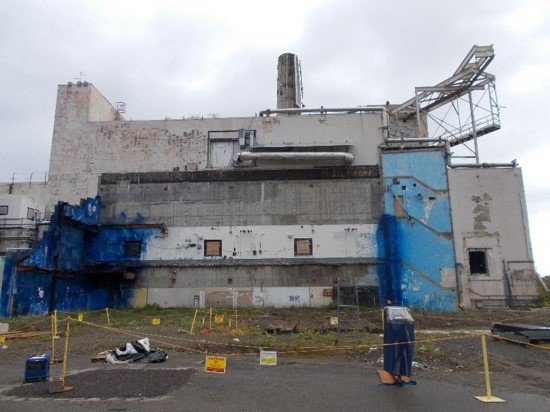An artist’s rendering of Hermes. (Image: Kairos Power)
The Nuclear Regulatory Commission issued a draft environmental impact statement (EIS) recently on Kairos Power’s application for a permit to construct Hermes, a 35-MW nonpower version of the company’s fluoride salt–cooled reactor design (KP-FHR), at the East Tennessee Technology Park in Oak Ridge, Tenn.
Canadian Nuclear Laboratories (Photo: AECL)
Atomic Energy of Canada Limited (AECL) has published a request for expressions of interest to manage and operate Canadian Nuclear Laboratories (CNL). The request is available on the MERX website.
According to AECL, the objective of the procurement and the resulting contract is to contain or reduce costs and risks for Canadian taxpayers while leveraging CNL’s capabilities and resources for Canadians.
Expressions of interest must be submitted via MERX on or before October 26, 2022.
DRUM team members at the Telluride 18 mine in the Yellow Cat area of southwest Colorado.
Based on a review of U.S. Atomic Energy Commission (AEC) records and available data from numerous agencies, there are an estimated 4,225 mines across the country that provided uranium ore to the U.S. government for defense-related purposes between 1947 and 1970. To aid in the cleanup of these legacy uranium mines and establish a record of their locations and current conditions, the Defense-Related Uranium Mines (DRUM) program was established within the Department of Energy’s Office of Legacy Management (LM).
Germany’s Isar nuclear plant, located in Essenbach, Bavaria. (Photo: Elmschrat/WikiCommons)
With a reluctant bow to the reality of the energy crisis gripping Europe, the German government this week took a slight step back from its antinuclear power stance, forging an agreement with the operators of the Isar and Neckarwestheim plants to keep those facilities in “operational reserve” this winter should they be needed to ensure the country’s energy security.
From left: Romanian energy minister Virgil Popescu; E-Infra CEO Teofil Mureșan; Nuclearelectrica board chairman Teodor Chirica; and U.S. undersecretary for economic development, energy, and environment Jose Fernandez. (Photo: Nuclearelectrica)
Energy firms Nuclearelectrica and Nova Power & Gas have launched a joint venture, RoPower Nuclear, for the development of small modular reactors in Romania, with SMR technology provided by NuScale Power, of Portland, Ore.
Largely state-owned, Nuclearelectrica operates Romania’s sole nuclear power facility, the two-unit Cernavoda plant, while Nova Power & Gas, a subsidiary of the privately held E-Infra Group, is a supplier and distributor of electricity and natural gas in Romania. The two firms own equal shares of RoPower.
ANS Standards Committee publishes new standard for light water reactor risk-informed, performance-based design
The new standard ANSI/ANS-30.3-2022, Light Water Reactor Risk-Informed, Performance-Based Design, has just been issued by the American Nuclear Society. Approved by the American National Standards Institute (ANSI) on July 21, 2022, the standard provides requirements for the incorporation of risk-informed, performance-based (RIPB) principles and methods into the nuclear safety design of commercial light water reactors. The process described in this standard establishes a minimum set of process requirements the designer must follow in order to meet the intent of this standard and appropriately combine deterministic, probabilistic, and performance-based methods during design development.
NNSA administrator Jill Hruby (left) holds up the signed MOU on HEU conversion during the agency’s virtual meeting with Japan’s MEXT. (Credit: NNSA)
The Department of Energy’s National Nuclear Security Administration (NNSA) has signed a memorandum of understanding with Japan’s Ministry of Education, Culture, Sports, Science, and Technology (MEXT). The MOU describes their commitment to convert the Kindai University Teaching and Research Reactor (UTR-KINKI) from high-enriched uranium fuel to low-enriched uranium fuel. The nuclear nonproliferation–related agreement also calls for the secure transport of all the HEU to the United States for either downblending to LEU or disposition.
Demolition of the MPPB, one of the last remaining major facilities at WVDP, is expected to be completed in about 30 months. (Photo: DOE)
The Department of Energy’s Office of Environmental Management (EM) said it has met one of its cleanup priorities for 2022 by beginning demolition of the Main Plant Process Building (MPPB) at the West Valley Demonstration Project (WVDP) in New York. Located 35 miles south of Buffalo, the 150-acre WVDP site is home to the only commercial spent nuclear fuel reprocessing facility to operate in the United States.
Belgium's Doel nuclear power plant. (Photo: N. Hippert/IAEA)
Unit 3 at the Doel nuclear power plant has become Belgium’s first reactor to be permanently shuttered, in keeping with that nation’s nuclear phaseout policy. The 1,006-MWe pressurized water reactor, which began commercial operation in October 1982, was removed from service last Friday at 9:31 p.m. (local time).
Belgium’s nuclear reactor fleet now consists of six operating units: Doel-1, -2, and -4 and Tihange-1, -2, and -3. Next on the retirement list is Tihange-2, scheduled to be shut down in February 2023.
(Image: Ana Kova /USFusionEnergy.org)
The Department of Energy announced up to $50 million for a new milestone-based fusion energy development program on September 22. The funding opportunity announcement is open to for-profit companies—possibly teamed with national laboratories, universities, and others—that are prepared to meet major technical and commercialization milestones leading to a pilot fusion power plant design.











 The International Atomic Energy Agency, for the second successive year, has revised upward its annual projections of nuclear power’s potential growth over the coming decades as an electricity provider.
The International Atomic Energy Agency, for the second successive year, has revised upward its annual projections of nuclear power’s potential growth over the coming decades as an electricity provider.


 The Department of Energy’s Office of Environmental Management (EM) released its
The Department of Energy’s Office of Environmental Management (EM) released its 
